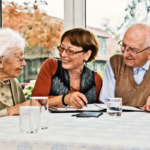9 Good Ways To Stay Healthy in Old Age
Diet, vitamins, exercise and pre-emptive safety measures; here’s how to live a happier, healthier, longer life in your own home.
Ageing is a natural part of life, and no matter how long we try and ward it off, it comes for us all. However, the mental and physical decline we often associate with old age is very much more under our control. Getting older doesn’t have to come hand-in-hand with poor health.
According to Age UK there are currently 11.4 million people aged 65+ in the UK, a figure set to pass the 20 million mark by 2030. People are living longer, so staying mentally and physically healthy is more important than ever.
9 good ways to stay healthy in old age
1. Mediterranean diet
The latest estimates suggest that 1.3 million people over 65 suffer from malnutrition, and over 60% of both older men and women suffer with abnormal blood pressure, which is something your diet has a real impact on.
Senior obesity is a real problem too, costing the NHS over £5 billion annually.
Medical Daily are one of many who recommend a Mediterranean diet in older age, rich in whole grains and nuts, heart-healthy fish, olive oil and vibrant fresh veg. A diet like this has been proven to help you live a longer and healthier life, even if it doesn’t always come with the Mediterranean sunshine.
2. Vitamin supplements and hydration
It’s common for older people to have specific micronutrient deficiencies. Key culprits are:
- Folate deficiency
- Vitamin B12
- Vitamin D
- Protein
Calcium
In an ideal world, we’d get all the nutrients we need from our diet, but this can sometimes be challenging. For the elderly, when these nutrients are more vital than ever for maintaining heart, bone and general health, taking a vitamin supplement is often a wise solution.
In addition, with water making up over 75% of our body mass, keeping hydrated is very important. De-hydration can lead to fatigue, headaches, confusion and loss of appetite.
Everyone’s needs are different, so talk to your GP about the vitamin supplements that are right for you.
3. Stay active
Exercise can feel like the last thing you want to do, especially if you’re starting to feel the aches and pains of older age settling in. Make time for it though, because it really does make a huge difference to your health. So much so, that a recent study found that only 30 minutes exercise a day reduces symptoms of arthritis by 47%, anxiety by 48%, dementia and Alzheimer’s by 50% and diabetes by 58%.
You don’t have to make big dramatic changes if you live a sedentary lifestyle. Simply walking to the shops instead of driving, cleaning the house, spending an hour gardening or walking can make all the difference. The key is to avoid spending all day sitting.
4. Regular check-ups
If you’re anything like me, getting check-ups falls to the back of the priority list unless there’s something concrete actually wrong. When you get older, though, having regular check-ups is critical to ensuring everything is running as it should be, and catching any problems long before they have a chance to take hold.
5. Elder-proof your home
It’s the seven ages of man, I know, but it is true to say that we get clumsier as we age, and less able to bounce back after a fall. In fact, around a third of all people over 65 fall each year, and falls are the single largest cause of emergency hospital admissions amongst the elderly.
Studies have found that a falls prevention strategy could reduce this number by up to 30%, so play your part and tidy loose wires, loose bits of carpet, broken railings – anything that could trip you up or catch you unawares later. It’s also worth regularly checking your fire and carbon monoxide alarms.
6. Get enough sleep
You’ve likely heard this one your whole life, but it’s only more important as you get older. Not getting a solid 8 hours or more can lead to depression, inattention, clumsiness, memory problems and the like. Getting enough sleep is an easy way to keep healthy in old age.
7. Train your brain
Whether it’s Sudoku or crosswords, brain-training games or puzzles, keeping your brain sharp plays a critical part in helping ward off memory loss as you get older. Although brain training games and the like aren’t a guaranteed panacea to memory loss, something nearly 35% of adults over 85 suffer with, they’re certainly worth doing.
8. Stay sociable
Being socially active is one of the most important things older people can do to keep healthy, both mentally and physically. Being part of a community and doing things you love helps you find meaning and joy in your life, avoid loneliness and re-energise.
Make it a habit to reach out to someone you know every day, whether that means popping to the shops with your neighbour, having a coffee with an old friend or volunteering as part of a local group.
9. Make Provisions
It might be a long way away yet, but wondering what will happen to us when we pass, and to those we leave behind, can be a real worry. Avoid the unnecessary stress by taking the appropriate precautions now: write your will, sort out any paperwork, generally get your important affairs in order.
It might be tempting to put this off, but burying one’s head in the sand won’t stop the indomitable beat of time. It’s worth doing, if only so you never need worry about it again.
It’s too true that ‘time and tide wait for no man’, but ageing doesn’t have to be synonymous with decline. Keep your golden years golden by following these 9 tips, and maintain your mental and physical health.





